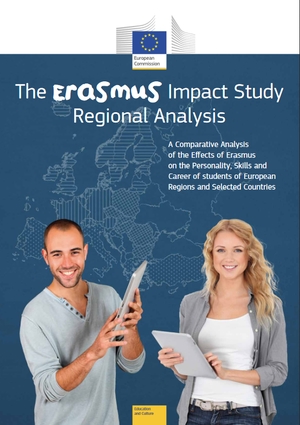Erasmus Studies or Traineeship
When you are going abroad to study or do a traineeship in Europe, you are able to apply for an Erasmus grant.
Erasmus stays can be in EU-membership countries as well as Norway, Iceland, Turkey, Liechtenstein and the Republic of Macedonia.
- Study periods should last between 2 and 12 months.
- Traineeships should last between 2 and 12 months.
- As a minimum, you should have completed your 1st year of studies, before you go on exchange.
- You must obtain the same amount of ECTS credits during your stay, as you would have at University College Absalon.
- Your Department must have an agreement with the host institution. For more information about your opportunities, look under destinations or ask your international coordinator.
Read the Erasmus Student Charter here.
What do to?
Before your exchange, an agreement (Learning og Traineeship agreement) is made between Absalon, you and the host institution. This agreement lists the contents of your stay (for example courses or tasks). The agreement also specifies how many ECTS credits you will receive after completing your exchange. When this agreement has been signed by all three parties and submitted to your international coordinator, Absalon can begin processing an Erasmus scholarship for you.
Agreement for traineeship
A "Training Agreement" must be completed, between University College Absalon, the place of traineeship and you (requires 3 signatures). The agreement describes the contents of the traineeship. This agreement also covers the question of how much merit you will receive for your completed exchange. The agreement must be signed before you go on your exchange and prior to you receiving your Erasmus grant.
Agreement for study exchange
A "Learning Agreement" must be completed between University College Absalon, the receiving educational institution and you (requires 3 signatures). Your Learning Agreement must contain the subjects/courses that you will follow and how many ECTS these subjects/courses will be awarded. The agreement must be signed before you go on your exchange and prior to you receiving your Erasmus grant
You are responsible for arranging your own trip, visa and residence/work permit (if necessary), adequate insurance and accommodation (often the host institution can assist you with this). You can of course always contact your international coordinator for help and guidance.
Insurance
If you are going on Erasmus traineeship or studies, it is your own responsibility to make sure you have the neccesary coverage, which is:
- Blue Health Insurance Card
- Accident insurance
- Travel insurance (must cover home transportation). A normal travel insurance normally only covers you for 60 days, therefore you should make sure you are covered the entire period, and also make sure that it covers studies or traineeships.
- Liability insurance
- Professional liability insurance (this is only mandatory for students going on a traineeship). Perhaps your host institution has an insurance that covers you.
You may also ask your International Coordinator for advice or the internaitonal office at international@pha.dk.
Before and after your stay: Online Linguistic Support (OLS)
If the language of instruction is not your first language, then you must take an online language assessment before and after your stay. The test results do not impact your eligibility for exchange; they are solely a way for you to assess your language competences.
Once you have been granted an Erasmus stay you will receive a link for the language test from Absalon.
*If you are a native speaker, you do not have to take the test.
Practical information
You will receive a fixed Erasmus grant while you are abroad. If you receive Danish SU, you may also be eligible to take this with you – however, you must contact the person responsible for SU at your Dpartment for more information about this.
You will receive 80 % of your Erasmus grant before your departure, while the remaining 20 % will be paid out once you have completed the final evaluations of your stay and your final OLS test. Your monthly scholarship depends on which country you are going to, how many days your stay lasts, and whether it is for studies or traineeship. Extra grants are awarded to students with special needs.
For students going on exchange to their home country
Please note that students who are going on an exchange (studies or traineeship) in their home country will be considered last for Erasmus grants, as the new Erasmus+ program aims to promote mobility outside of the student’s home country.
Read about your rights and responsibilities as an Erasmus student here: Erasmus Student Charter.
Erasmus+ short term blended mobility
As a student, you can participate in a short blended (combination of virtual and physical) mobility through Erasmus. This can either be:
BIP (Blended Intensive Programme), which is a blended learning experience where groups of students and/or staff participate together in an intensive blended learning and training program. Typically, it is the international coordinator of your program who will inform you about these opportunities.
Short-term blended mobility, which is a combination of physical mobility and a virtual activity before, during, or after the physical mobility. In this case, it is up to you as a student to express your interest in this type of mobility when you speak with your international coordinator.
Practical details:
The duration of the short-term stays is 5-30 days.
The funding is calculated on a daily rate, and as a student, you can expect to receive approximately 79 EUR per day for the physical part of the stay up to 14 days. From day 15, the rate drops to 56 EUR per day. Additionally, you will receive travel funds, which vary depending on the distance you need to travel.
Since this is an Erasmus stay, the same documents are required as for a long-term stay. This means that as a student, you need to complete/sign the following:
- Learning Agreement (in collaboration with the host institution/international coordinator)
- Grant Agreement (the agreement document for your scholarship)
- Certificate of Attendance (which must confirm that the stay has taken place)
- Questionnaires from both the EU survey and SurveyXact (required, otherwise the scholarship must be repaid).
If you have any questions, please contact international@pha.dk.
Erasmus+ Inclusion top-up
As a new initiative, Team Studieliv can provide students with an additional financial top-up if they identify with one (or more) of the categories below.
The top-up amounts to a maximum of 250 EUR extra per month.
The top-up is an increase to the regular Erasmus+ grant for standard travel and living expenses. The top-up removes barriers for students with fewer opportunities to participate in Erasmus+ mobility—it can address both barriers that are directly or indirectly related to the student's challenges. The target groups are defined as follows:
- Students with disabilities, chronic conditions, or conditions requiring ongoing treatment (including mental and physical disorders as well as learning difficulties).
- Students with civic duties or those called to serve in the Reserves.
- Caregivers or resource persons (parents, adoptive parents, caregivers for a sick family member, mentors, or support persons).
To be considered for the top-up, the student must complete an application and sign a sworn statement, which will be filed by Team Studieliv. It may be necessary for Team Studieliv to request additional documentation.
If you would like more information, please contact Team Studieliv at international@pha.dk.
Green Travel Top-up
At Absalon, we support the green transition and encourage all students to use environmentally friendly modes of transport when going abroad. With Erasmus+, you can receive a grant top-up if you travel to your destination by train, bus, or car (carpooling). Additionally, you can receive support for travel days if your journey takes more than two days.
See the travel grants here:
Travel distances (KM) | Standard | Green travel |
Between 100 and 499 | 211 EUR | 285 EUR |
Between 500 and 1999 | 309 EUR | 417 EUR |
Between 2000 and 2999 | 395 EUR | 535 EUR |
Between 3000 and 3999 | 580 EUR | 785 EUR |
Special Needs Support
Erasmus+ Programme special needs support
Erasmus+ pays particular attention to guidance, reception, physical accessibility, pedagogical and technical support services, and, especially, financing the extra costs for students and staff whose physical, mental or health-related conditions are such that their participation in Erasmus+ would not be possible without extra financial support (from here on referred to as “students and staff with physical, mental or health-related conditions”). This is to ensure that you can take full advantage of an Erasmus+ mobility experience.
Additional grant
For your access needs during your mobility, you can apply for an Erasmus+ grant for students and staff with physical, mental or health-related conditions in addition to the regular Erasmus+ study or traineeship or staff mobility grant. In preparation of your Erasmus+ mobility, you should indicate your needs and foreseen extra costs linked to your physical, mental or health-related conditions, in order to apply for the Erasmus+ special needs support grant.
What are your access needs?
Areas that could be eligible for support linked to your Erasmus+ mobility, according to individual needs, include but are not limited to: adapted accommodation, travel assistance, medical attendance, supportive equipment, adaption of learning material, an accompanying person, etc.
How to apply?
Please contact the International Office (international@pha.dk). Here you can also ask additional questions about special needs support.
Traineeships for recent graduates
It is possible for recent graduates to apply for funding for a traineeship. Only a limited number of such grants will be awarded, and the size of the monthly grant will depend on the number of applicants.
The following rules apply to recent graduates interested in traineeships:
- The conditions and application deadlines for regular traineeships must be observed. Read more here.
- The application must be submitted before the student graduates.
- The traineeship must be completed within the first year following the student’s graduation.
Erasmus grants
Erasmus+ rates
If you are granted an Erasmus scholarship, you will receive 70% of your scholarship before your departure, while the remaining 30% will be paid out upon the completion of your stay and the submission of all evaluations.
Your monthly scholarship amount depends on the country you are traveling to, the duration of your stay, and whether it is a study or internship placement. Special grants are available for students with special needs.
For further information, please contact Team Studieliv at international@pha.dk.


